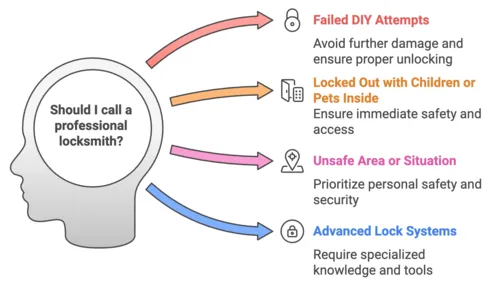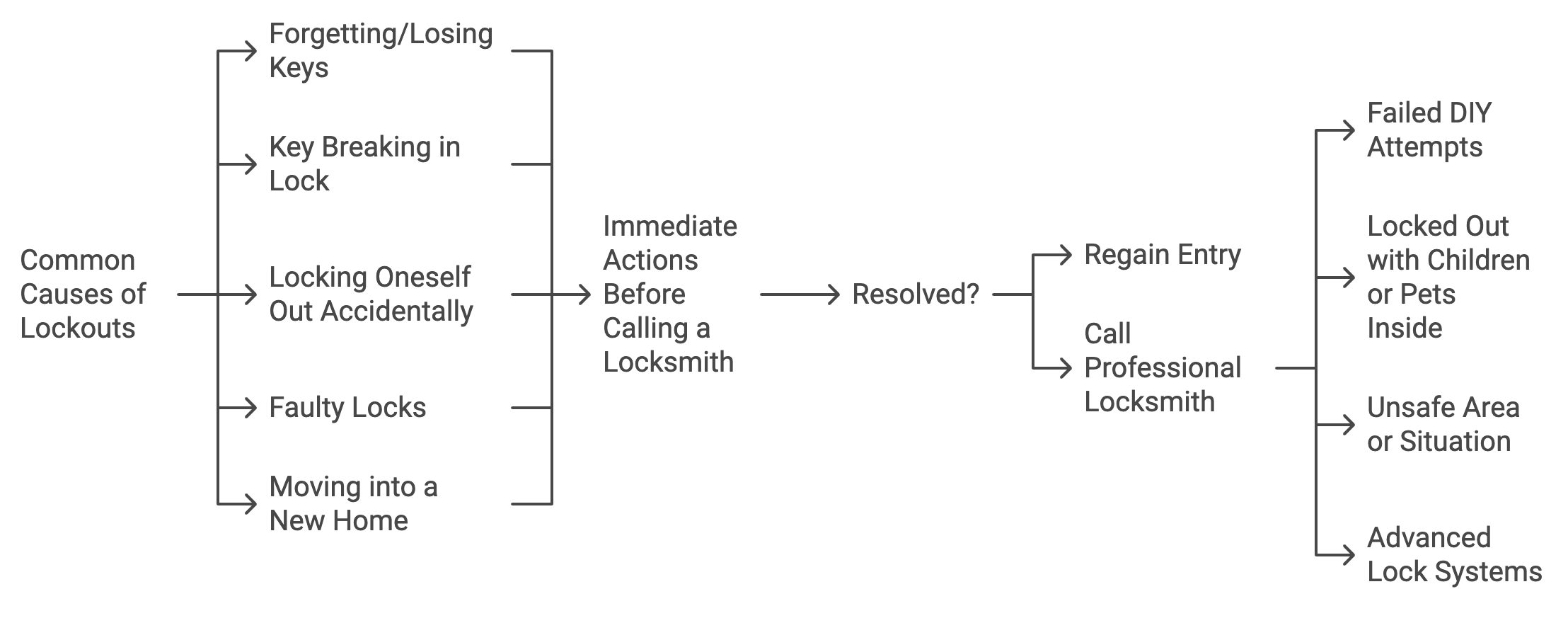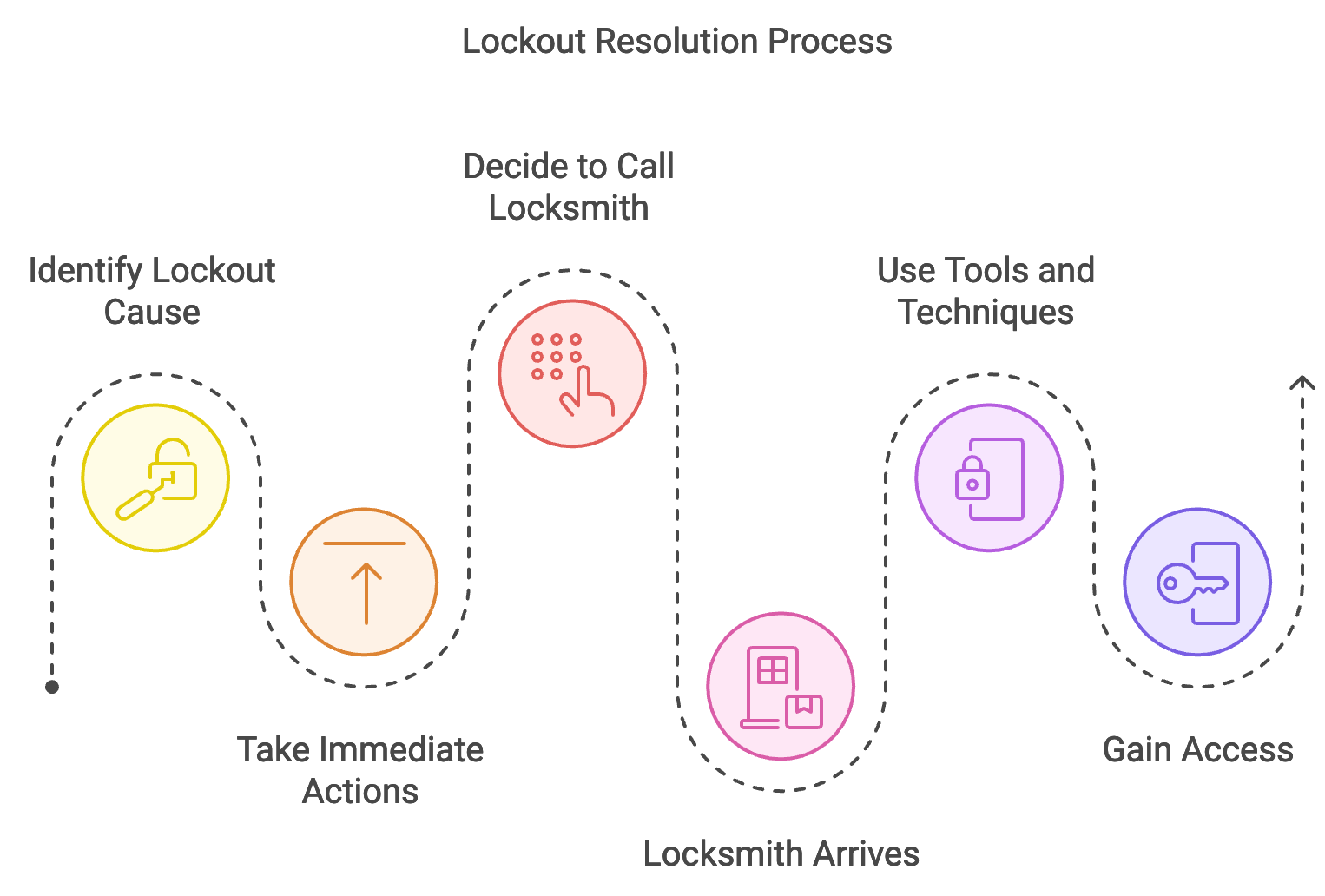

Being locked out of your home can be a frustrating and stressful experience. There are several common reasons why you may find yourself on the outside looking in:
Forgetting/Losing Keys: Perhaps the most obvious cause, simply misplacing or losing your keys can leave you stranded outside your home. Whether you lost them while running errands or they slipped out of your pocket unnoticed, a missing key is an instant recipe for a lockout.
Key Breaking in Lock: Over time, keys can become worn or damaged, especially if used frequently or with excessive force. If a key breaks off in the lock cylinder, you'll be unable to turn the mechanism and gain entry.
Locking Oneself Out Accidentally: It's easy to accidentally lock yourself out, whether you stepped outside to take out the trash, retrieve a package, or let a pet out and had the door close and lock behind you. A moment's lapse in attention is all it takes.
Faulty Locks: Locks don't last forever, and older models or those of poor quality may fail over time. Stuck or jammed locks, broken mechanisms, or worn-out keys can all contribute to an unexpected lockout.
Moving into a New Home: When moving into a new property, there's always a risk that the previous occupants or owners may have failed to provide all copies of the keys. You could find yourself locked out until new keys can be made or the locks changed.
No matter the cause, being locked out is an inconvenient and potentially unsafe situation. Knowing what to do and having a plan can help you regain entry quickly and minimize the disruption.
Before calling a locksmith for assistance, there are several steps you can take to attempt regaining entry to your home on your own. First, thoroughly check all doors and windows to ensure you haven't overlooked an unlocked point of entry. If you have a spare key hidden outside, attempt to locate and use it. Alternatively, call a trusted friend or family member who may have a spare key to let you inside.
If you feel comfortable attempting basic lock picking techniques, you can try using a straightened paperclip or similar rigid wire to manipulate the lock cylinder and binding pin. However, exercise caution as improper lock picking can cause further damage. Avoid using excessive force or makeshift tools that could break inside the lock.
For rental properties, you may be able to contact your landlord or property manager for assistance in regaining entry before calling a locksmith. They may have a master key or be able to provide guidance based on the specific lock system used.
 While attempting DIY solutions or seeking assistance from friends and family may be tempting when locked out, there are certain situations where calling a professional locksmith is the safest and most efficient course of action.
While attempting DIY solutions or seeking assistance from friends and family may be tempting when locked out, there are certain situations where calling a professional locksmith is the safest and most efficient course of action.
Failed DIY Attempts: If you've tried various DIY methods to regain entry, such as using a credit card or coat hanger, and they've proven unsuccessful, it's best to avoid causing further damage to your locks or doors. A skilled locksmith has the proper tools and expertise to unlock your door without compromising its integrity.
Locked Out with Children or Pets Inside: If you've been locked out of your home with children or pets still inside, it's crucial to seek immediate professional help. Locksmiths can quickly and safely gain entry, ensuring the well-being of those trapped inside and preventing potential accidents or distress.
Unsafe Area or Situation: If you find yourself locked out in an area that feels unsafe or poses a security risk, calling a locksmith is the wisest choice. They can promptly resolve the lockout, allowing you to safely regain access to your home without putting yourself in harm's way.
Advanced Lock Systems: Modern lock systems, such as electronic or biometric locks, can be challenging to bypass without specialized knowledge and tools. Locksmiths are trained to handle these advanced locking mechanisms, ensuring a secure and proper resolution to your lockout situation.
In these circumstances, attempting DIY solutions or relying on inexperienced individuals could lead to further complications, property damage, or even legal issues. A professional locksmith not only offers a reliable and efficient service but also provides peace of mind, ensuring your safety and the security of your home.

Locksmiths have a variety of specialized tools and techniques at their disposal to handle lockouts safely and efficiently. Here are some common methods they may employ:
Lock Picking: Skilled locksmiths can use lock pick sets to manipulate the internal components of a lock and disengage the locking mechanism without causing damage. This technique requires extensive training and experience.
Key Impressioning: In some cases, locksmiths can create a new key by analyzing the impressions left on a blank key after inserting it into the lock and applying pressure. This non-destructive method can be effective for certain lock types.
Drilling: As a last resort, locksmiths may drill into the lock cylinder to release the locking mechanism. This technique is typically used when other methods are unsuccessful or when time is of the essence. It requires precise drilling to avoid damaging the lock housing or door.
Lock Bypassing: Some locksmiths have specialized tools to bypass the lock entirely by manipulating the door's latch or strike plate. This method is often used for doors with minimal clearance or when the lock is inaccessible.
Lock Replacement: In situations where the existing lock is too damaged or compromised, locksmiths can replace the entire lock with a new one. This may be necessary after a forced entry or if the lock is beyond repair.
Reputable locksmiths follow strict protocols and use non-destructive techniques whenever possible to minimize damage and ensure the security of your home. Their expertise and specialized tools enable them to handle lockouts efficiently while prioritizing the safety of you and your property.
When faced with a lockout emergency, it's crucial to ensure you're hiring a legitimate and trustworthy locksmith. Unfortunately, there are unscrupulous individuals who may attempt to take advantage of your vulnerable situation. To protect yourself and your property, take the following steps to verify the locksmith's credentials:
First, check if the company is properly licensed and insured. Reputable locksmiths will be licensed by the state or local authorities, and they should carry liability insurance to protect you in case of any damages or injuries during the job.
Next, research the company's online reviews and ratings. Look for consistent positive feedback from previous customers, which can indicate a reliable and professional service. Be wary of companies with numerous negative reviews or complaints about overcharging, shoddy workmanship, or unethical practices.
When the locksmith arrives, request to see their identification and verify that it matches the company they claim to represent. A legitimate locksmith will have no issue providing proper identification and should be wearing a company uniform or have a clearly marked vehicle.
Speaking of vehicles, take a moment to inspect the locksmith's vehicle for proper company branding and logos. Reputable companies typically have their name and contact information prominently displayed on their service vehicles.
Finally, don't hesitate to ask questions and voice any concerns you may have. A professional locksmith should be transparent about their pricing, services, and qualifications, and they should be willing to address any doubts or apprehensions you may have before proceeding with the job.
By taking these precautions, you can ensure that you're dealing with a trustworthy and skilled locksmith, minimizing the risk of falling victim to scams or subpar workmanship during an already stressful situation.
Emergency locksmith services can be costly, especially if you need assistance after regular business hours. Here's a breakdown of the typical costs you can expect:
Service Call Fee: Most locksmiths charge a flat service call fee, which can range from $35 to $100 or more, depending on your location and the time of day. This fee covers the locksmith's time and travel expenses.
After-Hours Rates: If you require locksmith services outside of regular business hours, such as late at night or on weekends and holidays, you can expect to pay a premium. After-hours rates can be 50% to 100% higher than standard rates.
Lock Replacement Costs: If your lock is damaged or needs to be replaced, you'll need to factor in the cost of the new lock and its installation. Basic doorknob locks can cost anywhere from $50 to $200, while more advanced locks like deadbolts or electronic locks can range from $100 to $500 or more.
Key Cutting Charges: If you need new keys made, locksmiths typically charge between $3 and $10 per key, depending on the key type and complexity. Some locksmiths may also charge an additional fee for programming transponder keys or fob keys for vehicles.
It's essential to discuss all costs upfront with the locksmith to avoid any surprises. Many locksmiths offer flat-rate pricing for common services, which can help you budget accordingly. Additionally, some locksmiths may offer discounts for seniors, students, or members of certain organizations.
Avoiding the stress and expense of a lockout should be a priority for all homeowners and renters. Taking proactive measures can save you time, money, and frustration down the line. Here are some effective strategies to prevent future lockouts:
Make Spare Keys: Always have at least one spare key for your home, and keep it in a secure location away from your primary residence. Give a spare to a trusted friend, family member, or neighbor who can assist you in case of an emergency lockout.
Install Smart Locks: Upgrade to smart lock technology, which allows you to unlock your doors remotely using a smartphone app or voice commands. Smart locks eliminate the need for physical keys and provide additional security features like activity logs and temporary access codes for guests or service providers.
Repair Faulty Locks: If you notice any issues with your locks, such as sticking or difficulty turning the key, address the problem promptly. Faulty locks can lead to lockouts or even security breaches. Consider hiring a professional locksmith to inspect and repair any problematic locks.
Secure Key Hiding Spots: If you choose to hide a spare key outside your home, be cautious and creative with your hiding spot. Avoid obvious locations like under the doormat or a fake rock, as these are the first places potential intruders will check. Instead, consider a secure lockbox or a discreet spot only known to trusted individuals.
By implementing these preventative measures, you can significantly reduce the likelihood of future lockouts and the associated stress and costs. Remember, a little preparation can go a long way in ensuring your peace of mind and the security of your home.
Getting locked out of your home can be a stressful and frustrating situation, but it's important to approach it legally and responsibly. One crucial factor to consider is proof of residency. Locksmiths will typically require documentation, such as a government-issued ID, lease agreement, or utility bill, to verify that you are the rightful resident of the property before providing services. Failure to provide adequate proof could result in denial of service or potential legal consequences.
If you are a renter, it's essential to obtain permission from your landlord or property management company before attempting to gain entry or hiring a locksmith. Many rental agreements have specific clauses regarding lockouts and unauthorized entry, and violating these terms could lead to penalties or even eviction. It's always better to communicate openly with your landlord and follow the proper channels.
In some cases, attempts to regain entry may cause unintentional damage to the property, such as broken windows or damaged door frames. It's important to be aware that you may be held liable for any damages incurred during the lockout resolution process, even if it was an accident. Discussing potential risks and liabilities with the locksmith beforehand can help you make informed decisions and avoid costly mistakes.
Additionally, certain areas or municipalities may have civil code restrictions or regulations regarding lockouts and locksmith services. These regulations are in place to protect consumers from unscrupulous practices and ensure that proper procedures are followed. Familiarizing yourself with local laws and ordinances can help you navigate the situation legally and avoid potential fines or legal complications.
Remember, while getting locked out can be an inconvenience, prioritizing legal and ethical conduct is crucial. Respecting property rights, following proper procedures, and exercising caution can help you resolve the situation safely and without any legal repercussions.
Being locked out of your home can be a stressful situation, especially when children or pets are involved. It's crucial to keep them safe, calm, and comfortable until you can regain access. Here are some important tips:
Keep Children and Pets Close: Ensure that your children and pets remain near you and do not wander off. This will prevent them from getting lost, injured, or creating additional safety concerns.
Provide Reassurance: Children may feel scared or anxious during a lockout. Speak to them in a calm, reassuring manner, and explain that you are taking steps to resolve the situation. For pets, use a soothing tone and offer treats or toys to keep them occupied.
Access to Necessities: If the lockout extends for several hours, you'll need to ensure that your children and pets have access to food, water, and any necessary medications. Pack snacks, water bottles, and any essential items they may require.
Shelter and Comfort: Depending on the weather conditions, you may need to find a temporary shelter or a shaded area to protect your children and pets from extreme temperatures or inclement weather. Bring blankets, umbrellas, or other items to keep them comfortable.
Entertainment and Distractions: Bring along books, toys, or portable electronics to help keep children occupied and distracted during the waiting period. For pets, you can offer interactive toys or treats to prevent boredom and restlessness.
Restroom Facilities: Plan for restroom breaks, especially for young children or pets that need to relieve themselves. Have a plan for nearby public restrooms or appropriate areas for your pets.
Remember, the safety and well-being of your children and pets should be the top priority during a lockout situation. By taking proactive measures and remaining calm, you can minimize stress and ensure their comfort until the issue is resolved.
Once a locksmith gains entry, you'll need to decide whether to simply rekey the locks or replace them entirely. This decision depends on the condition of the existing locks and the overall security needs of your home. Rekeying involves reconfiguring the lock to work with a new key, while replacement means installing brand new lock hardware.
For a straightforward lockout with no damage to the locks, rekeying is generally the most cost-effective solution. Locksmiths can rekey most residential locks on-site for $40-$100 per lock. However, if the locks are old, worn, or of poor quality, replacement may be advisable for enhanced security and peace of mind.
New lock installation costs $60-$300 per lock for parts and labor. While more expensive upfront, replacement ensures you have modern locks meeting the latest security standards. This is especially worthwhile if you've lost all copies of the previous key or suspect the old keys were compromised.
When rekeying, request that all locks (entry doors, windows, garage, etc.) use the same new key for convenience. This typically costs a bit more but eliminates the hassle of managing multiple keys. Proper rekeying by a certified locksmith is more secure than purchasing new locks from a hardware store and installing them yourself.
Call Our Emergency Locksmith London team now for a free quote, consultation and advice